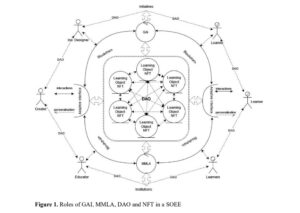
Blockchain-Powered SOEE
Mehmet Frat, a researcher at Turkey’s Anadolu University, has recently published a study titled “Smart Open Education Ecosystem” (SOEE) that envisions a multi-tech remedy to the problems confronting the traditional educational system.
The research integrates blockchain, decentralized autonomous organizations (DAOs), nonfungible tokens (NFTs), multimodal learning analytics, and artificial intelligence (AI) to create a self-sufficient educational ecosystem.

According to a research paper written by Frat and published on July 25, “equity, fair opportunity, and access issues are among the most significant obstacles to education in the contemporary world.”
Frat proposes a blockchain-based “open education” system that employs generative AI systems such as ChatGPT or similar to interact with students and personalize their learning experiences.
Lessons, learning resources, and credentials would all be created as NFTs, and a DAO would govern the procedure.
According to Firat, the ultimate aim of open education is not only to democratize education and make it accessible but also to provide personalized learning experiences for all.
Although Frat’s research is not the first to investigate open education on the blockchain, it is among the most ambitious, according to the research paper:
“Even if the systems we have seen [as] examples of open universities and other structures support this philosophy and approach, they are far from this common goal because they have not yet been able to integrate artificial intelligence, blockchain and big data.”
The paper asserts that “the convergence of these technologies can […] pave the way for the singularity in education.”
Frat adds that “this could be the first social organization of humanity to reach singularity.”
In the context of technology, a singularity is a paradigm in which the evolution of technology is beyond the creators’ ability to control.
Theoretically, lifelong free education would become universal at the point of educational singularity founded on technological convergence.
“However,” writes Frat, “there will be twelve primary benefits of the SOEE before this distant goal is reached.”
Accessibility, personalization, education quality, security, and transparency, democratic governance, intellectual property, and content value, global cooperation and integration, equality and equal opportunity, reusability of educational resources, preservation and promotion of cultural and linguistic diversity, innovation and experimental learning in education, and support for student success and career planning are among these benefits.
According to Frat, educational stakeholders and policymakers should conduct additional research on the prospective benefits of SOEE.





